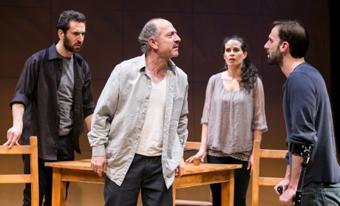‘The Admission’: Israeli-Palestinian Secrets
By • June 9, 2014 0 1551

“The Admission” lives on at the Mead Theatre at the Studio Theatre after its run as a workshop at Theater J. This controversial piece by Motti Lerner, an Israeli, addresses the often difficult conversations that can go on between Arabs and Jews across the world.
Andy Shallal, former mayoral candidate, restaurateur and owner of Bus Boys and Poets, is producing this second run of this show. Lerner’s inspiration for “The Admission” comes from the story of Giora, a wounded veteran of a military action in Lebanon. Giora tried to retrospectively understand the motives behind the murder of a group of Palestinian civilians by a unit under the command of his father – an Israeli soldier — some 40 years earlier during the 1948 Arab-Israeli conflict.
The talented Danny Gavigan plays Giora, the wounded veteran who is physically reminded every day of the constant conflict of his country, as he can only get around on crutches. Michael Tolaydo plays Avigdor, his father, a man who is cares very much about his family and their future, as he carries the weight of his actions of the past with him. Both actors beautifully portray the conflict we all have with letting go of the guilt and memory of our past actions to prevent us from moving forward and embracing the present.
Kimberly Schraf (Yona) commits whole-heartedly for the two-hour run of the show as the wife and mother to these two and tries to keep the family together as well as her husband’s construction business going. Yona is also dealing with the loss of one son as the result of the conflict and mourns his loss with grace, while trying to keep her husband and son from doing something they will regret.
Where it seems Lerner took some creative liberties is in the relationships in Giora’s personal life. He is engaged to a lovely Jewish girl, Neta, played by Elizabeth Anne Jernigan. Jernigan’s performance is a tender display of the struggle many wives of veterans would sympathize with. Giora is also involved with a young and feisty Arab woman, Samya, played by Nora Achrati. He works with her at the university in Haifa, and they have an ongoing affair that his family and finance are aware of, but their relationship is not accepted due to their religious differences. This aspect of the play seems a little like a soap opera. There is no real way to reinvent the plot line of boy and girl should get married, but boy gets distracted by a more unique girl he can’t ever really be with because of societal or religious pressures.
In the same vein, the play also struggles structurally at points in that the show is broken down into more than a dozen short scenes. This left the piece feeling choppy and ending abruptly at times, lots of small two- or three-person scenes, when the full cast is only seven characters. The structure almost felt like the piece would play better as a movie script.
Design-wise, the production was very clean and simple. This could be due to the relocation of the production, or just to allow the audience to follow the actors through the half a dozen locations the play takes place. Klyph Shoham designed the projections, which were displayed on a screen that when not in use matched the design on the deck of the stage in a simple grid pattern. When in use, the screen displayed dull images on green landscapes, construction in the city and some images of historic ruins. The projections were only used in the beginning and very end of the show. I was left wanting them used more consistently throughout the production. It might have helped bring the audience be more easily aware of the multiple locations.
One choice that I appreciated in the design of the show was that when actors “exited” the stage they were simply seated off the stage but still intentionally in sight of the audience. They sat in silence at well-lit café tables awaiting their next scene intently watching what was happening on stage. This speaks to one of the overarching metaphors of the piece that the actions of our loved ones truly affect us whether we see their choices play out or not.
Lerner’s work takes a hard look at the issue of the Israeli-Palestinian conflict. It presents difficult conversations between family members and different families trying to live and work freely in the same community. Each performance is followed by a discussion, led by a Theatre J staffer and a few of the actors. They hope to continue the dialogue the production inspires.
“The Admission” will run at the Mead Theatre at the Studio Theatre through May 18. For tickets, visit the Bus Boys and Poets [website](http://theadmission.bpt.me/).

